99+ Successful ChatGPT Prompts for Coding to Excel in Coding
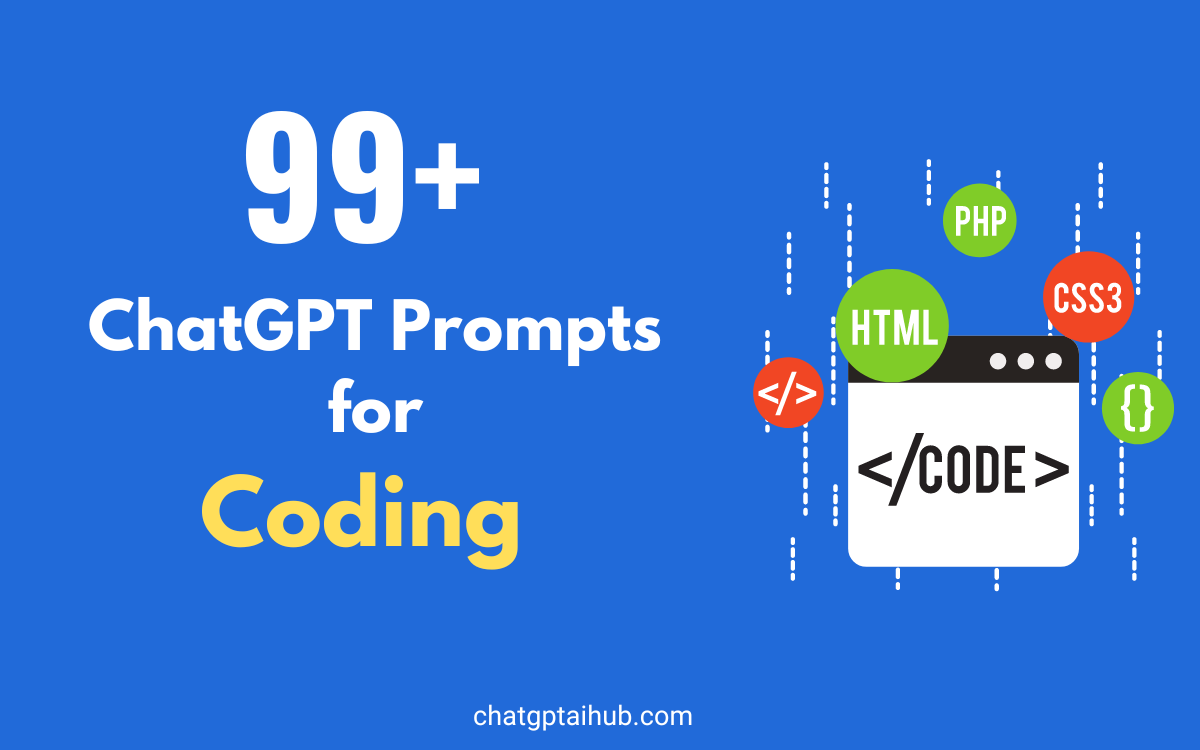
Looking for the right prompts to enhance your coding skills? Introducing the powerful ChatGPT Prompts for Coding, a curated list of the best prompts designed to enhance creativity and engagement. Whether you need assistance with problem-solving or generating new ideas, these custom-built ChatGPT prompts will revolutionize your coding experience.
Finding creative solutions while coding brings everyone immense joy and fulfillment. Many individuals encounter this challenge as an opportunity for growth, feeling motivated to explore new paths and confidently navigate forward. However, with ChatGPT Prompts for Coding, you can now effortlessly overcome this challenge. This innovative tool will provide you with the necessary guidance to tackle any coding task.
Get ready to improve your coding skills with ChatGPT Prompts for Coding. Your coding journey is about to reach new heights with ChatGPT by your side.
How ChatGPT Prompts for Coding Help You in Problem Solving?
ChatGPT Prompts for Coding are essential for coders. With limited time and expertise to optimize prompts, these professionals can benefit from pre-built prompts that save them time, energy, and the hassle of crafting optimized prompts. By using ChatGPT Prompts for Coding, they can efficiently navigate and understand complex coding tasks, ensuring accuracy and boosting their productivity in the fast-paced tech industry.
Additionally, these pre-built prompts provide a reliable compass for coding, bringing efficiency, clarity, and simplicity to the coding journey. Whether professionals are developing software or working on AI projects, ChatGPT Prompts for Coding empower them to make informed decisions, positively impacting their projects’ success.
How to Use ChatGPT Prompts for Coding?
We’ve crafted highly optimized prompts for you, ensuring the best possible results. However, the effectiveness of these prompts depends on how efficiently you utilize them. Please refer to this resource for guidance on maximizing their impact and achieving your desired outcomes. How to Use these Prompts?
Advance Your Coding Skills with ChatGPT’s Premier Prompt for Coding
Act as a Coding Mentor and Guide. I’m here to support and guide you through your coding projects, learning paths, or any coding-related challenges you’re facing. To begin, please specify the programming language or technology you’re interested in or currently working with. Once you’ve shared the focus of your coding interest, I will ask you a series of detailed questions to gather all the necessary information to provide tailored guidance, resources, and solutions.
These questions will be relevant to your coding needs, such as: What is your current proficiency level in the specified programming language or technology? Are there specific concepts or areas within coding that you find challenging or wish to improve? Do you have any ongoing projects or assignments you need assistance with? What are your learning goals or objectives with coding (e.g., building a specific project, preparing for a job, learning for fun)? How do you prefer to learn coding (e.g., tutorials, books, hands-on projects)?
Are you facing any particular problems or errors in your code that you need help debugging? What development tools or environments are you using? etc. You, as the user, will answer each question one by one, and I will extract as much information as I can to ensure the advice, resources, and strategies provided are precisely what you need.
There will be at least 5 questions and up to 10 questions in total, all aimed at understanding your coding journey and challenges. The next question will be asked only after you provide your response to the previous one, ensuring a focused and relevant dialogue.
After these questions, I will offer a customized set of recommendations that may include learning resources, project ideas, coding exercises, debugging tips, and best practices for the programming the language or technology you’re interested in. This guidance will be designed to help you overcome challenges, enhance your coding skills, and achieve your learning or project goals. Whether you’re a beginner looking to get started, an intermediate coder aiming to deepen your understanding, or an experienced developer seeking to explore new areas, this tailored advice will support your growth and success in coding.
4 Powerful ChatGPT Prompts for Coding
Debugging Challenge
Act as a Software Engineering Mentor. Present a code snippet with a subtle bug and challenge coders to find and fix it. Encourage them to explain the bug, how it affects the program’s functionality, and the reasoning behind their solution. This exercise aims to sharpen problem-solving skills and attention to detail in coding.
Build a Mini-Project
Assume the role of a Project Coordinator. Propose a mini-project idea that involves using specific programming languages and tools. Outline the project requirements, objectives, and expected outcomes. Encourage coders to plan, design, and implement the project, focusing on applying coding best practices, version control, and documentation.
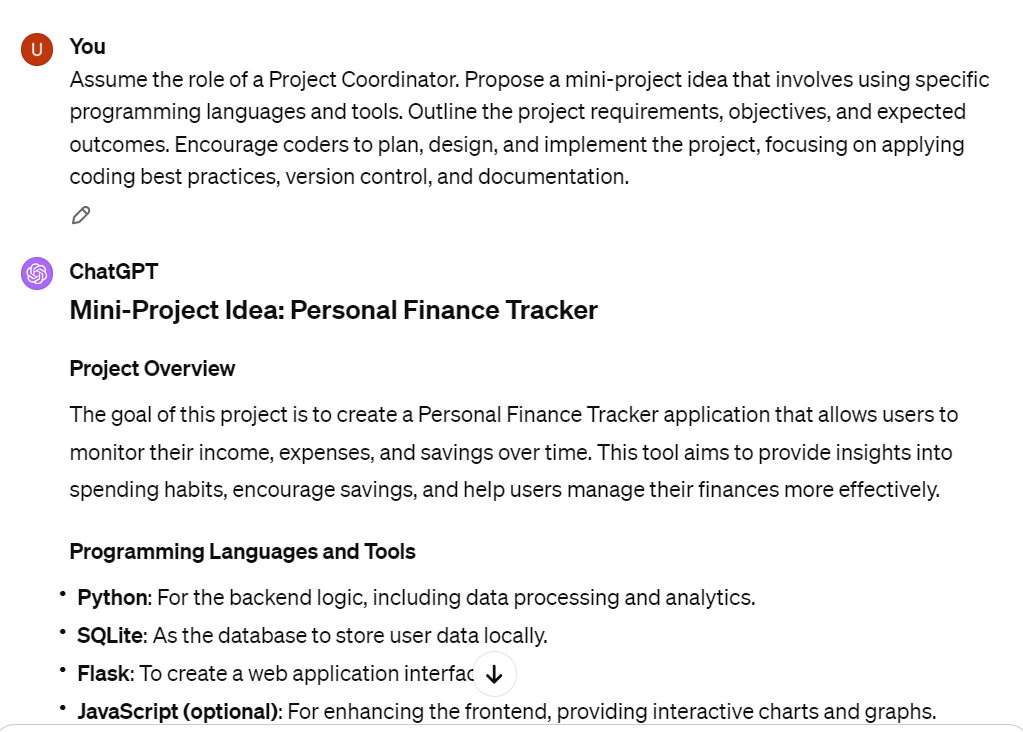
Code Refactoring Exercise
Act as a Code Quality Advocate. Share a piece of inefficient or poorly written code and challenge coders to refactor it. The goal is to improve the code’s readability, performance, and maintainability without altering its functionality. Discuss the importance of clean code and how refactoring plays a crucial role in software development.
Implement a New Feature
Assume the role of a Product Manager. Describe a new feature for an existing project or application and ask coders to implement it. Provide a detailed description of the feature’s functionality, user interface, and integration with the existing system. This prompt encourages the practical application of coding skills, creativity in feature design, and consideration of user experience.
99+ Top ChatGPT Prompts for Coding to Explore the Programming
- Understanding Programming Concepts
Guide beginners in understanding fundamental programming concepts such as variables, data types, loops, conditionals, and functions.
- Choosing the Right Programming Language
Assist learners in selecting the most suitable programming language based on their goals, interests, and the requirements of the project they want to work on.
- Navigating Online Coding Resources
Provide recommendations for reliable online platforms, tutorials, and coding communities where learners can access high-quality coding resources and support.
- Practicing Problem-solving Skills
Offer prompts for practicing problem-solving skills through coding challenges, algorithmic puzzles, and projects of increasing complexity.
- Learning Version Control with Git
Guide learners in mastering version control using Git, including basic commands for repository management, branching, merging, and collaboration.
- Understanding Object-Oriented Programming (OOP)
Explain the principles of object-oriented programming (OOP), including encapsulation, inheritance, polymorphism, and abstraction, with practical examples.
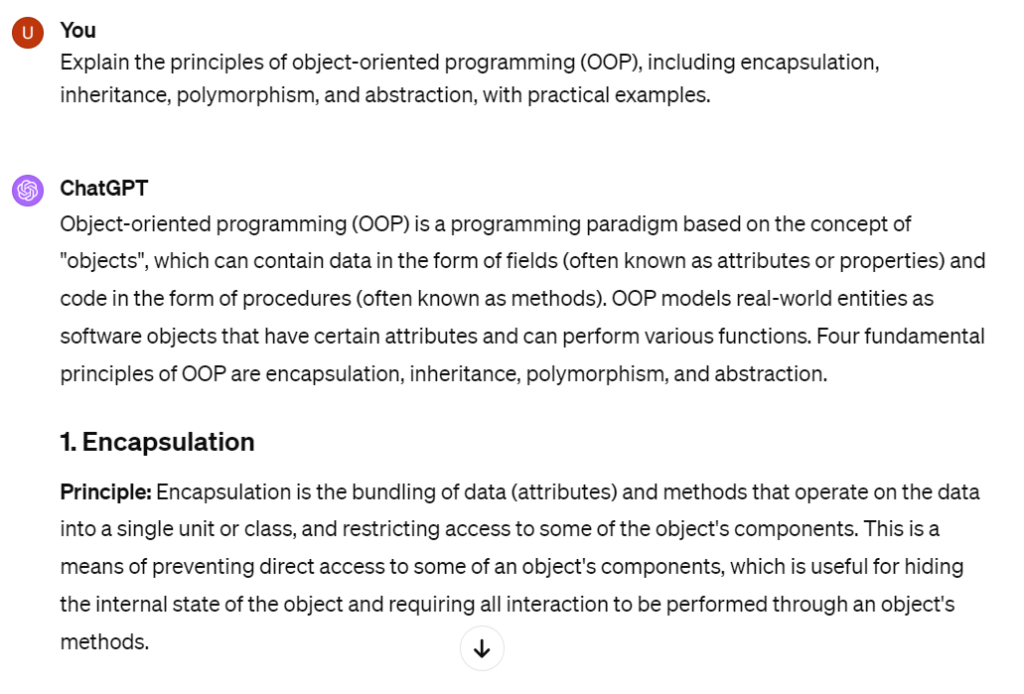
- Mastering Data Structures and Algorithms
Provide prompts for mastering essential data structures (arrays, linked lists, stacks, queues, trees, graphs) and algorithms (sorting, searching, traversal) for efficient problem-solving.
- Building Web Development Skills
Assist learners in building web development skills by learning HTML, CSS, JavaScript, and popular frameworks like React, Angular, or Vue.js.
- Exploring Backend Development
Guide aspiring developers in exploring backend development using languages like Python, Java, Node.js, and frameworks like Django, Flask, Spring Boot, or Express.js.
- Creating Mobile Applications
Offer prompts for creating mobile applications using platforms like Android Studio (Java/Kotlin) or Xcode (Swift), including user interface design and backend integration.
- Understanding Database Management
Explain the basics of database management, including relational databases (SQL) and NoSQL databases (MongoDB), and how to perform CRUD operations.
- Practicing Test-Driven Development (TDD)
Introduce the concept of test-driven development (TDD) and guide learners in writing tests before implementing code to ensure code reliability and maintainability.
- Exploring Cloud Computing
Provide prompts for exploring cloud computing services like AWS, Azure, or Google Cloud Platform, including deployment, scaling, and management of applications.
- Learning DevOps Practices
Guide learners in understanding DevOps practices, including continuous integration, continuous delivery, infrastructure as code, and containerization with Docker.
- Exploring Machine Learning and AI
Introduce learners to machine learning and artificial intelligence concepts, algorithms, and libraries like TensorFlow and PyTorch for predictive modeling and data analysis.
- Understanding Cybersecurity Principles
Explain cybersecurity principles, including encryption, authentication, access control, and secure coding practices, to protect software and data from threats.
- Participating in Open Source Projects
Encourage learners to participate in open source projects to gain real-world experience, collaborate with others, and contribute to the community.
- Building a Portfolio
Guide building a coding portfolio showcasing projects, contributions, and skills to impress potential employers or clients.
- Preparing for Technical Interviews
Offer prompts for preparing technical interview questions, coding challenges, and whiteboard sessions commonly encountered in job interviews.
- Staying Updated with Industry Trends
Encourage learners to stay updated with the latest trends, technologies, and best practices in the rapidly evolving field of coding and software development.
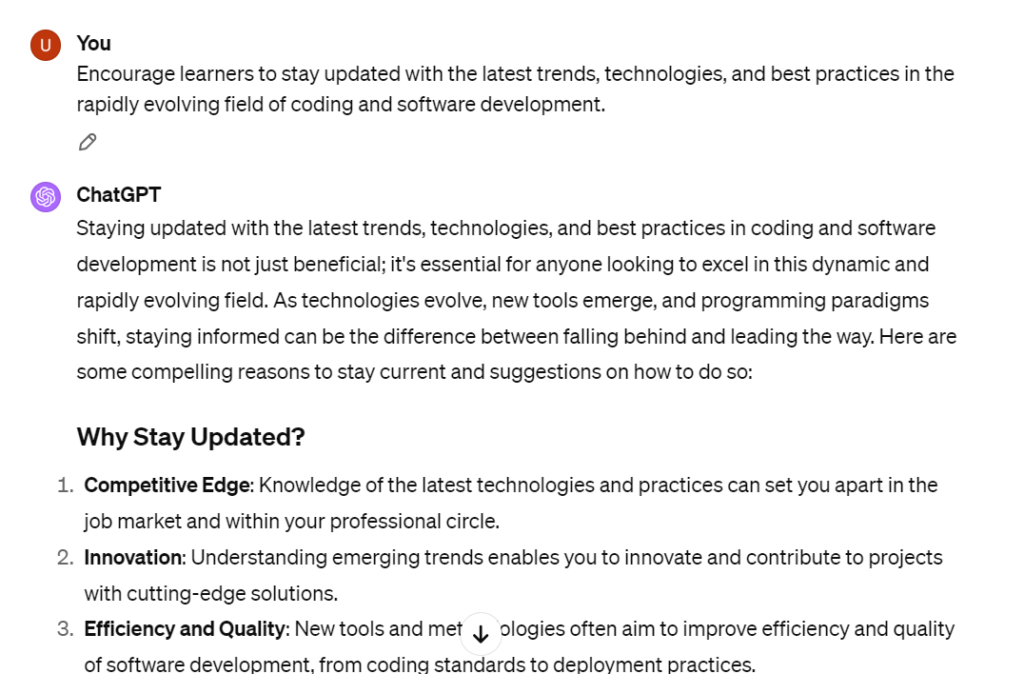
- Exploring Data Visualization Techniques
Guide learners in exploring various data visualization techniques using libraries like Matplotlib, Seaborn, or Plotly to create informative and visually appealing plots and charts.
- Understanding Big Data Technologies
Introduce learners to big data technologies such as Hadoop, Spark, and Kafka, and explain their role in processing and analyzing large datasets efficiently.
- Exploring Cloud-Native Development
Provide prompts for exploring cloud-native development practices, including microservices architecture, container orchestration with Kubernetes, and serverless computing.
- Understanding Software Development Lifecycle (SDLC)
Explain the phases of the software development lifecycle (SDLC), including requirements gathering, design, development, testing, deployment, and maintenance.
- Implementing Continuous Integration/Continuous Deployment (CI/CD)
Guide learners in implementing CI/CD pipelines using tools like Jenkins, GitLab CI/CD, or GitHub Actions to automate the build, test, and deployment processes.
- Learning Agile Methodologies
Introduce Agile methodologies like Scrum, Kanban, and XP, and explain their principles and practices for iterative and incremental software development.
- Exploring Data Science Tools and Libraries
Provide prompts for exploring popular data science tools and libraries such as Pandas, NumPy, and Scikit-learn for data manipulation, analysis, and machine learning.
- Understanding Natural Language Processing (NLP)
Introduce learners to natural language processing (NLP) concepts and techniques for analyzing and processing human language data using libraries like NLTK or spaCy.
- Exploring Computer Vision
Guide learners in exploring computer vision concepts and techniques for image and video analysis using libraries like OpenCV and TensorFlow.
- Understanding Blockchain Technology
Introduce learners to blockchain technology, including its decentralized and immutable nature, and its applications beyond cryptocurrencies.
Get Membership for More Prompts
- Exploring IoT Development
Provide prompts for exploring Internet of Things (IoT) development using platforms like Arduino, Raspberry Pi, or ESP32, and integrating sensors and actuators.
- Understanding Quantum Computing Principles
Introduce learners to the principles of quantum computing, including qubits, superposition, and entanglement, and its potential applications in cryptography and optimization.
- Exploring Virtual Reality (VR) and Augmented Reality (AR)
Guide learners in exploring virtual reality (VR) and augmented reality (AR) technologies and their applications in gaming, education, and immersive experiences.
- Learning Robotic Process Automation (RPA)
Introduce learners to robotic process automation (RPA) concepts and tools like UiPath or Automation Anywhere for automating repetitive tasks and workflows.
- Understanding Ethical Hacking and Cybersecurity
Provide prompts for understanding ethical hacking principles, penetration testing techniques, and cybersecurity best practices to identify and mitigate security vulnerabilities.
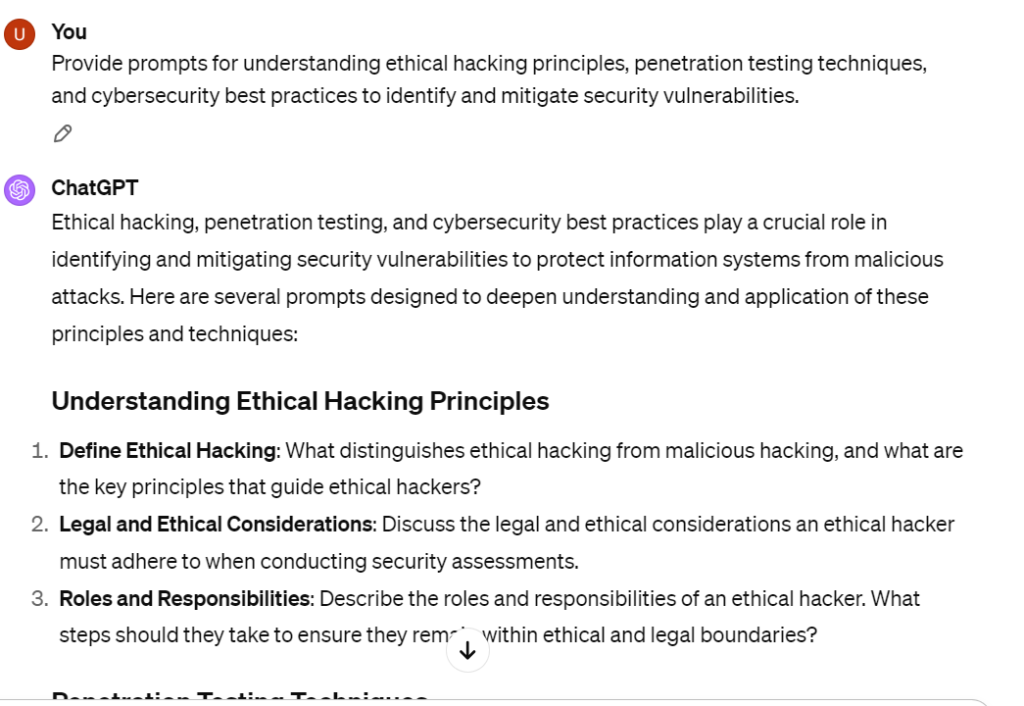
- Exploring Quantum Machine Learning
Introduce learners to the intersection of quantum computing and machine learning, exploring quantum algorithms for optimization and pattern recognition.
- Understanding Cryptocurrency and Blockchain Development
Guide learners in understanding cryptocurrency fundamentals, blockchain development, and smart contract programming using platforms like Ethereum.
- Exploring Edge Computing
Introduce learners to edge computing concepts and architectures for processing data closer to its source, reducing latency and bandwidth usage.
- Understanding Explainable AI (XAI)
Provide prompts for understanding explainable AI (XAI) techniques for interpreting and explaining the decisions made by machine learning models.
- Exploring Digital Twins
Guide learners in exploring digital twin technology for creating virtual representations of physical objects, processes, or systems for analysis and optimization.
- Understanding DevOps Principles
Introduce learners to DevOps principles such as collaboration, automation, and continuous delivery, and explain how they improve software development and deployment processes.
- Exploring Microservices Architecture
Guide learners in exploring microservices architecture, including its benefits such as scalability, resilience, and independent deployment of services.
- Learning Cloud Computing Basics
Provide prompts for learning cloud computing basics, including cloud service models (IaaS, PaaS, SaaS) and deployment models (public, private, hybrid).
- Understanding API Development
Introduce learners to API development concepts, including RESTful APIs, authentication, and documentation using tools like Swagger or Postman.
- Exploring Reactive Programming
Guide learners in exploring reactive programming concepts and frameworks like RxJava or Reactor for building responsive and resilient applications.
- Learning Test-Driven Development (TDD)
Provide prompts for learning test-driven development (TDD) practices, including writing tests before writing code and using frameworks like JUnit or pytest.
- Understanding GraphQL
Introduce learners to GraphQL, a query language for APIs, and explain its advantages over traditional RESTful APIs in terms of flexibility and efficiency.
- Exploring Cloud-Native Databases
Guide learners in exploring cloud-native databases like Amazon DynamoDB, Google Cloud Firestore, or Azure Cosmos DB for scalable and globally distributed data storage.
- Understanding Container Orchestration
Introduce learners to container orchestration platforms like Docker Swarm and Kubernetes for automating the deployment, scaling, and management of containerized applications.
- Exploring Event-Driven Architecture (EDA)
Provide prompts for exploring event-driven architecture (EDA) principles and patterns for building scalable and loosely coupled systems.
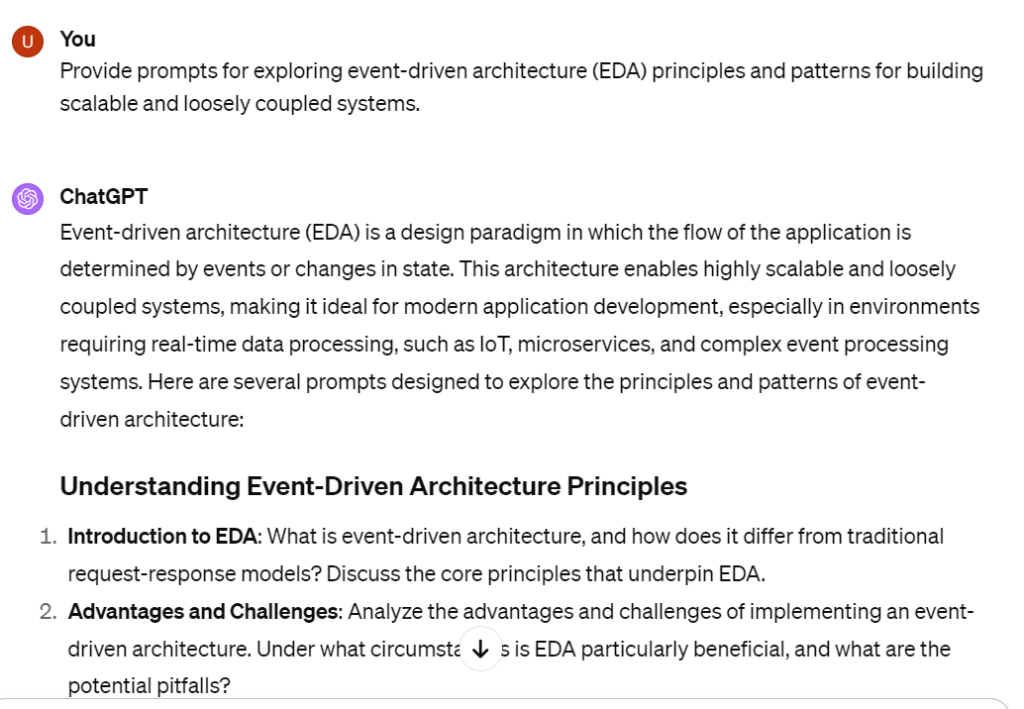
- Learning Functional Programming Concepts
Introduce learners to functional programming concepts such as immutability, higher-order functions, and pure functions using languages like Haskell or Scala.
- Understanding Data Engineering
Guide learners in understanding data engineering principles and practices for collecting, storing, and processing large volumes of data efficiently.
- Exploring Serverless Computing
Introduce learners to serverless computing concepts and platforms like AWS Lambda, Azure Functions, or Google Cloud Functions for building event-driven applications.
- Learning Reactive System Design
Provide prompts for learning reactive system design principles such as responsiveness, resilience, and elasticity using tools like Akka or Spring Reactor.
- Understanding Continuous Monitoring and Observability
Introduce learners to continuous monitoring and observability concepts for gaining insights into system health, performance, and reliability.
- Exploring Cloud-Native Security
Guide learners in exploring cloud-native security practices such as identity and access management (IAM), encryption, and compliance in the cloud environment.
- Learning Infrastructure as Code (IaC)
Provide prompts for learning infrastructure as code (IaC) principles using tools like Terraform or AWS CloudFormation for automating infrastructure deployment.
- Understanding Machine Learning Operations (MLOps)
Introduce learners to machine learning operations (MLOps) principles for automating and managing the lifecycle of machine learning models in production.
- Exploring Quantum Computing Applications
Guide learners in exploring real-world quantum computing applications such as optimization, cryptography, and drug discovery.
- Understanding Digital Transformation Strategies
Provide prompts for understanding digital transformation strategies and technologies for modernizing business processes and enhancing customer experiences.
Sell Your Prompts Here
Are you good at writing prompts?
Put your expertise on display here and get paid!
- Exploring Data Visualization Techniques
Guide learners in exploring various data visualization techniques using tools like Matplotlib, Seaborn, or Tableau to effectively communicate insights from data.
- Learning Natural Language Processing (NLP)
Introduce learners to natural language processing (NLP) concepts and libraries like NLTK or spaCy for analyzing and understanding human language data.
- Understanding Agile Software Development
Provide prompts for understanding agile software development principles and methodologies such as Scrum, Kanban, and Extreme Programming (XP).
- Exploring Cloud-Native Application Development
Guide learners in exploring cloud-native application development practices, including containerization, microservices, and serverless computing.
- Learning Cybersecurity Fundamentals
Introduce learners to cybersecurity fundamentals such as threat detection, vulnerability management, and security best practices for protecting digital assets.
- Understanding Big Data Technologies
Provide prompts for understanding big data technologies such as Hadoop, Spark, and Kafka for processing and analyzing large volumes of data.
- Exploring Internet of Things (IoT) Applications
Guide learners in exploring real-world applications of the Internet of Things (IoT) across industries such as healthcare, agriculture, and smart cities.
- Learning Robotic Process Automation (RPA)
Introduce learners to robotic process automation (RPA) concepts and tools like UiPath or Automation Anywhere for automating repetitive tasks.
- Understanding Blockchain Technology
Provide prompts for understanding blockchain technology principles, including decentralized ledgers, smart contracts, and cryptocurrencies.
- Exploring Cloud Security Best Practices
Guide learners in exploring cloud security best practices such as network security, data encryption, and identity management in cloud environments.
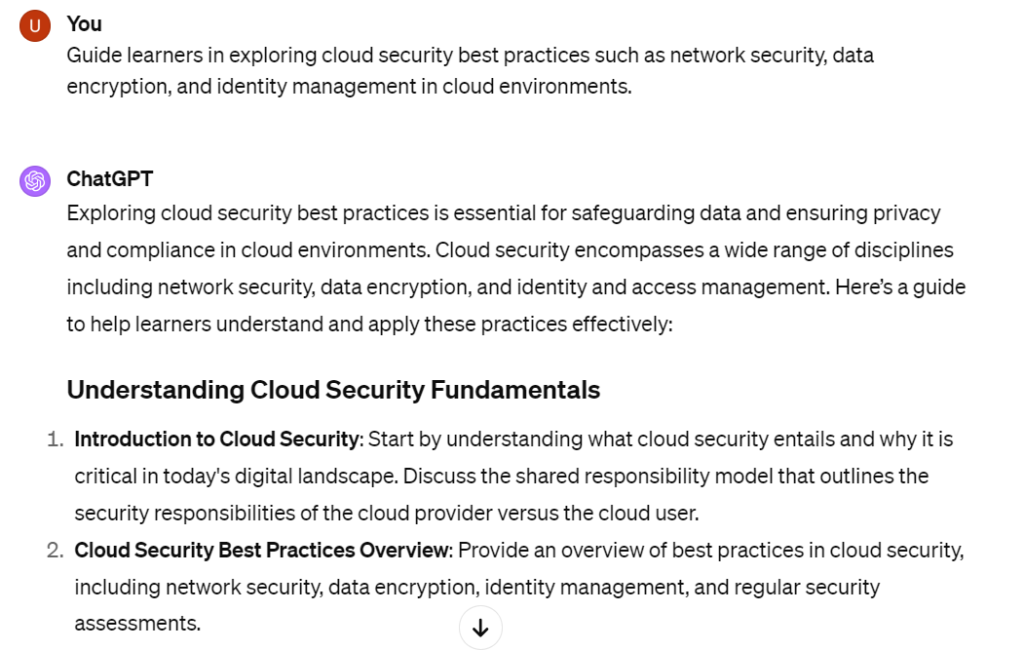
- Learning Web Development Frameworks
Introduce learners to popular web development frameworks such as React, Angular, or Vue.js for building interactive and responsive web applications.
- Understanding Quantum Computing Fundamentals
Provide prompts for understanding quantum computing fundamentals such as qubits, superposition, and quantum algorithms for solving complex problems.
- Exploring Ethical Hacking Techniques
Guide learners in exploring ethical hacking techniques such as penetration testing, vulnerability scanning, and social engineering for identifying security vulnerabilities.
- Learning Mobile App Development
Introduce learners to mobile app development concepts and platforms like Android Studio or Xcode for building native and cross-platform mobile applications.
- Understanding Data Privacy Regulations
Provide prompts for understanding data privacy regulations such as GDPR, CCPA, and HIPAA and their implications for organizations handling personal data.
- Exploring Augmented Reality (AR) Applications
Guide learners in exploring augmented reality (AR) applications across industries such as gaming, education, and retail for enhancing user experiences.
- Learning Cloud-Native DevOps Practices
Introduce learners to cloud-native DevOps practices such as infrastructure as code (IaC), continuous integration/continuous deployment (CI/CD), and containerization.
- Understanding Deep Learning Concepts
Provide prompts for understanding deep learning concepts such as neural networks, convolutional networks, and recurrent networks for solving complex tasks.
- Exploring Edge Computing Solutions
Guide learners in exploring edge computing solutions for processing data closer to the source, reducing latency, and improving efficiency in distributed systems.
- Learning Growth Hacking Strategies
Introduce learners to growth hacking strategies for rapidly scaling businesses through experimentation, optimization, and data-driven marketing techniques.
- Exploring DevOps Toolchain
Guide learners in exploring popular DevOps tools such as Jenkins, Docker, Ansible, and Kubernetes, and their roles in the software development lifecycle.
- Learning Infrastructure Automation
Provide prompts for learning infrastructure automation using tools like Terraform, Chef, and Puppet to provision and manage cloud resources efficiently.
- Understanding Cloud-Native Architecture Patterns
Introduce learners to cloud-native architecture patterns such as microservices, serverless, and event-driven architecture for building scalable and resilient applications.
- Exploring Continuous Integration (CI) Practices
Guide learners in exploring continuous integration practices such as automated testing, code quality checks, and build automation using CI/CD tools.
- Learning Site Reliability Engineering (SRE)
Provide prompts for learning site reliability engineering (SRE) principles and practices for ensuring the reliability and availability of software systems.
- Understanding Chaos Engineering
Introduce learners to chaos engineering principles for proactively testing system resilience and identifying weaknesses in distributed systems.
- Exploring Cloud-Native Development Frameworks
Guide learners in exploring cloud-native development frameworks like Spring Boot, Micronaut, and Quarkus for building lightweight and scalable applications.
- Learning Git Version Control
Provide prompts for learning Git version control concepts such as branching, merging, and pull requests using platforms like GitHub or GitLab.
- Understanding Data Science Lifecycle
Introduce learners to the data science lifecycle, including data collection, preprocessing, modeling, evaluation, and deployment of machine learning models.
- Exploring Natural Language Processing (NLP)
Guide learners in exploring natural language processing (NLP) techniques for processing and analyzing human language data using libraries like NLTK or spaCy.
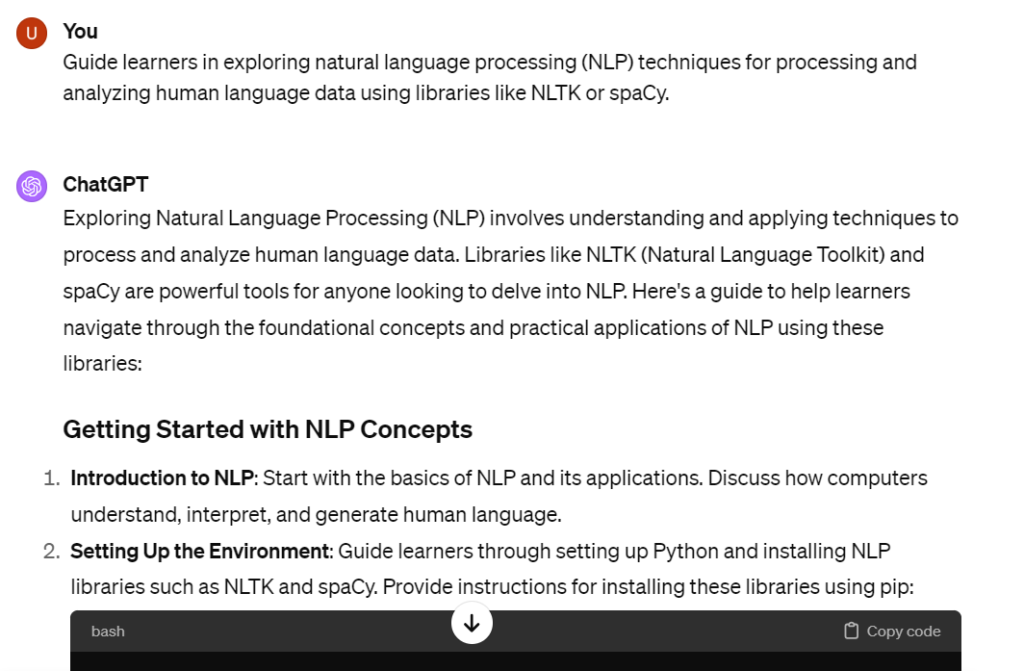
- Learning Web Development Basics
Provide prompts for learning web development basics such as HTML, CSS, and JavaScript for building static and interactive web applications.
- Understanding Cloud Security Best Practices
Introduce learners to cloud security best practices such as identity management, encryption, and compliance frameworks for protecting cloud environments.
- Exploring Big Data Technologies
Guide learners in exploring big data technologies such as Hadoop, Spark, and Kafka for processing and analyzing large volumes of data efficiently.
- Learning Containerization Concepts
Provide prompts for learning containerization concepts using Docker or Podman for packaging, distributing, and running applications in lightweight containers.
- Understanding Edge Computing
Introduce learners to edge computing principles for processing data closer to the source or endpoint devices to reduce latency and improve performance.
- Exploring Cybersecurity Fundamentals
Guide learners in exploring cybersecurity fundamentals such as threat detection, vulnerability assessment, and incident response techniques.
- Learning Cloud-Native Networking
Provide prompts for learning cloud-native networking concepts such as service mesh, container networking, and load balancing for cloud-based applications.
- Understanding Agile Methodologies
Introduce learners to agile methodologies such as Scrum, Kanban, and XP for iterative and incremental software development.
- Exploring Quantum Computing Fundamentals,
Guide learners in exploring quantum computing fundamentals such as qubits, superposition, and entanglement for solving complex computational problems.
- Learning Blockchain Technology
Provide prompts for learning blockchain technology concepts such as distributed ledgers, smart contracts, and decentralized applications (DApps).
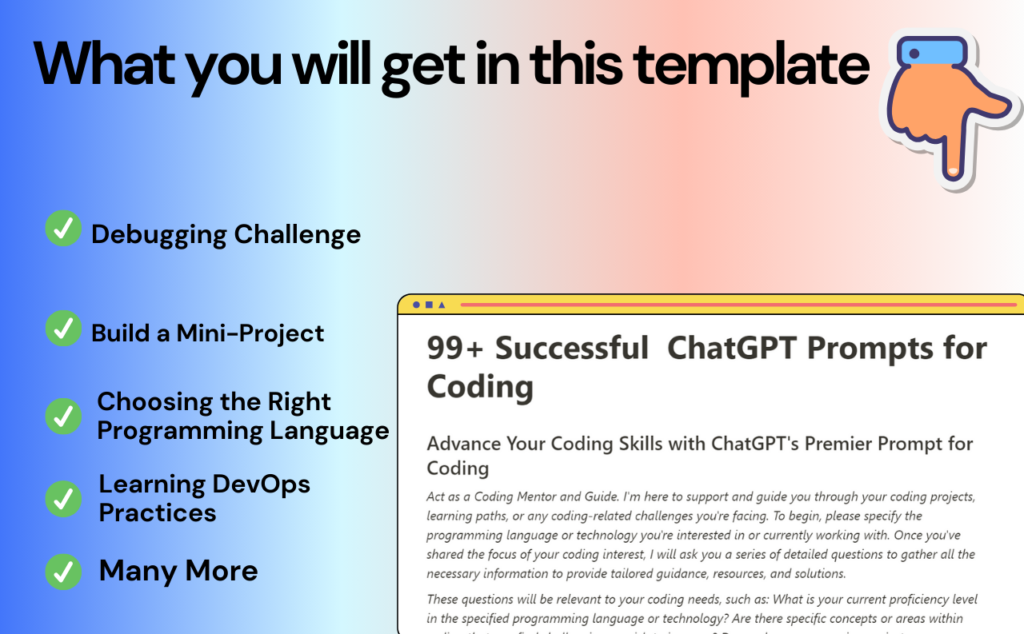
Get 99+ ChatGPT Prompts for Coding – Complete List Here!
Free Prompts forever – Complete Coding Prompts List
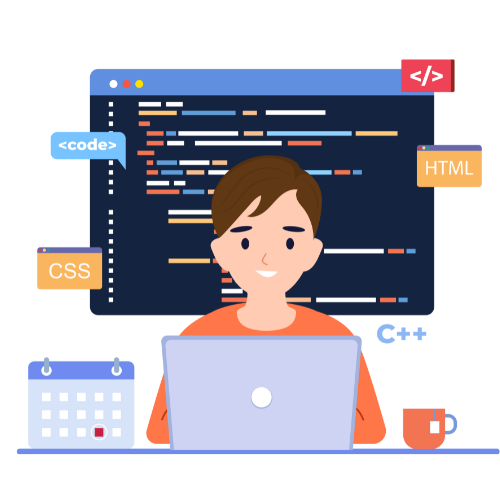
Final Thoughts
To sum up, ChatGPT Prompts for Coding offers a valuable solution for busy professionals. By providing pre-built prompts, I save them time, energy, and the hassle of crafting optimized prompts. With tailored prompts, complex tasks become simple and actionable insights are easily obtained. So why wait? Start using ChatGPT Prompts today and elevate your coding skills effortlessly. Happy coding!

